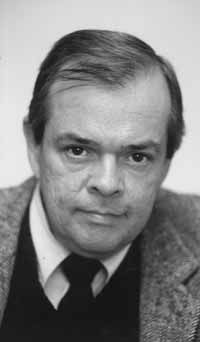“Did you hear?” my stepdaughter called from the Ukrainian League of Philanthropists where she works. “Petro Jacyk died.” That evening I called Mykailo Slaboshpytsky, executive director of that organization. “He was like a father to me,” he said. “I knew him longer than you, but not better,” was all I could say. “I want to take part in the next Ukrainian language contest awards ceremony the same as last time” (when I presented the winner with a memorial portrait of Benjamin Franklin on a hundred dollar bill). “Now it will be named for Jacyk,” he said. “His widow and daughter have promised their support.” I said goodbye and began to think about Petro. He was, after all, eighty, which means that the good Lord gave him a decade over the Biblical threescore and ten. I must say that he used it well.
My thoughts drifted back two decades. It was 1981, I had just earned my Ph.D. in history from the University of Michigan and been hired by the Harvard Ukrainian Research Institute to take part in a project to study the Holodomor, the Ukrainian Famine of 1933, a topic as terrible as any. The fund-raisers of the Ukrainian Studies Fund wanted to see what they were paying for, and donor number one, Petro Jacyk, met me at the Toronto airport. “Let’s go,” he said. “I’ve arranged for you to meet some people who lived through the Famine.”
We met them. I already knew the documents in the Soviet press of the period, but only then did I begin to understand that dealing with human tragedy is far from an easy task. For those interested, there is a three-volume collection, The Oral History of the Commission on the Ukraine Famine, in every US depository of government documents. Thanks to the help the Association of Ukrainian Professionals and Businessmen of New York and New Jersey, I was able to design a project and send a young Ukrainian graduate student on the road with a tape recorder even before the commission was created, but it was Petro who put me on the track.
Petro later helped create the Chair of Ukrainian Studies at the University of Toronto, then at York University, set up an institute at the University of Alberta to translate Hrushevsky’s ten volumes (History of Ukraine Rus’) into English, and also funded a program at the University of London. “I believe in history,” he once told me. He knew that if the people of this benighted land or those abroad came to understand the full tragedy of the past, there would be a beginning of something new and as impetuously indefatigable as this Ukrainian who refused to be poor, started from nothing, made his fortune, and began to give something back to his people.
Death is a far bitterer pill for the living than for the dead. They have passed through the light to a hopefully far better world, while we are left to mourn for the absence that remains with us. We mourn for Petro Jacyk and look forward to our reunion when we too pass over to that other shore.







